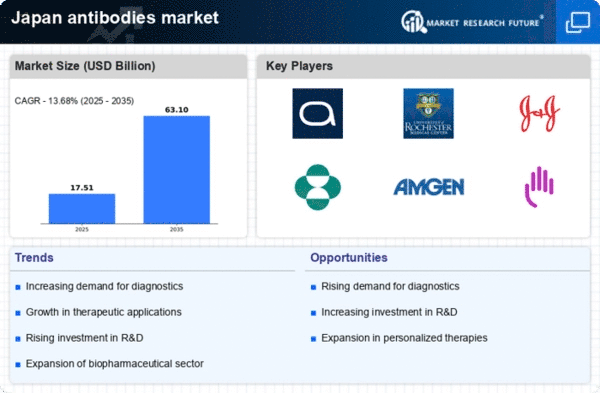Regulatory Support for Biologics
Japan's regulatory environment is becoming increasingly favorable for the development and approval of biologics, including antibodies. The Pharmaceuticals and Medical Devices Agency (PMDA) has streamlined the approval process for new therapies, which is likely to encourage investment in the antibodies market. This regulatory support is crucial, as it reduces the time and cost associated with bringing new antibody-based treatments to market. Furthermore, the Japanese government has initiated programs to promote research and development in biopharmaceuticals, which could lead to a surge in innovative antibody therapies. As a result, the antibodies market is poised for significant expansion in the coming years.
Aging Population and Healthcare Demand
Japan's demographic shift towards an aging population is significantly impacting the antibodies market. With over 28% of the population aged 65 and older, there is an increasing demand for healthcare services and innovative treatments. Older adults are more susceptible to chronic diseases, which drives the need for effective antibody therapies. The healthcare system is under pressure to provide advanced treatment options, and antibodies are becoming a preferred choice due to their targeted action and reduced side effects. This demographic trend is likely to sustain the growth of the antibodies market as healthcare providers adapt to the evolving needs of the aging population.
Growing Prevalence of Chronic Diseases
The increasing incidence of chronic diseases in Japan is a pivotal driver for the antibodies market. Conditions such as cancer, autoimmune disorders, and infectious diseases are on the rise, necessitating advanced therapeutic solutions. According to recent health statistics, chronic diseases account for approximately 60% of all deaths in Japan, highlighting the urgent need for effective treatments. This trend is likely to propel the demand for monoclonal antibodies, which are increasingly recognized for their efficacy in treating various chronic conditions. The antibodies market is expected to witness substantial growth as healthcare providers seek innovative therapies to address these pressing health challenges.
Collaboration Between Academia and Industry
The collaboration between academic institutions and the biopharmaceutical industry in Japan is fostering innovation in the antibodies market. Universities and research organizations are increasingly partnering with companies to develop novel antibody therapies. This synergy is crucial for translating scientific discoveries into practical applications, enhancing the pipeline of new treatments. In 2025, it is estimated that collaborative research projects will account for over 30% of new antibody developments in Japan. Such partnerships not only accelerate the research process but also ensure that the antibodies market remains at the forefront of therapeutic advancements, ultimately benefiting patients and healthcare providers alike.
Rising Investment in Research and Development
Investment in research and development (R&D) within Japan's biopharmaceutical sector is a critical driver for the antibodies market. The Japanese government and private sector are increasingly allocating funds to support innovative research, particularly in the field of antibody therapeutics. In 2025, R&D spending in the biopharmaceutical industry is projected to reach approximately ¥1 trillion, reflecting a growing commitment to advancing medical science. This influx of capital is likely to foster the development of novel antibodies, enhancing treatment options for patients. Consequently, the antibodies market is expected to benefit from this robust investment landscape, leading to the introduction of cutting-edge therapies.
















